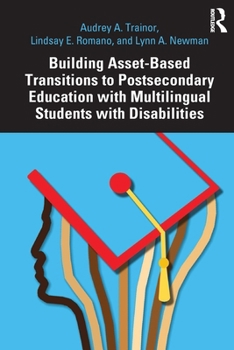Building Asset-Based Transitions to Postsecondary Education with Multilingual Students with Disabilities
This important volume presents the results from a five-year, mixed methods study on the transition from high school to postsecondary education for young adults who, during secondary school, received both English learner and special education services. It aims to improve our understanding of, and thus the supportive service provisions for, the dually identified student population in secondary and higher education settings. The book explores dually identified students' complex and intersectional experiences, strengths, and needs using multiple methods of inquiry, including the examination of educational transition-focused policies and practices, a comprehensive review of research results, case studies, and comparative analysis of key stakeholder perspectives for this student population. With a focus on equitable, culturally sustaining transition research and practice, the book informs graduate students, researchers, and teacher educators about how to mitigate the effects of historical marginalization, increasing our collective understanding of intersectional experiences and how they shape young adults' choices as they leave high school and move into young adulthood.





